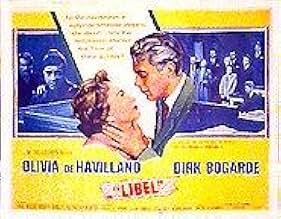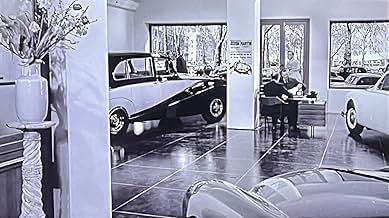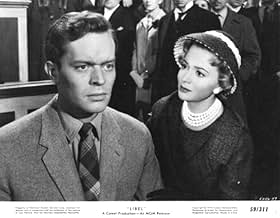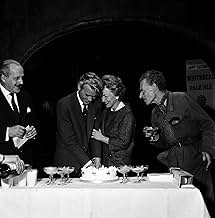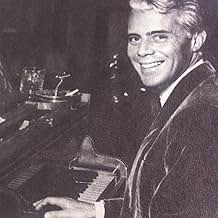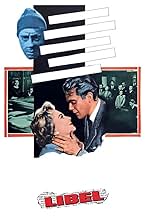NOTE IMDb
7,2/10
1,7 k
MA NOTE
Ajouter une intrigue dans votre langueA shell-shocked World War II veteran with memory problems is accused of being an impostor by a former comrade.A shell-shocked World War II veteran with memory problems is accused of being an impostor by a former comrade.A shell-shocked World War II veteran with memory problems is accused of being an impostor by a former comrade.
- Réalisation
- Scénario
- Casting principal
- Nommé pour 1 Oscar
- 1 nomination au total
Wilfrid Hyde-White
- Foxley
- (as Wilfrid Hyde White)
Avis à la une
This Anthony Asquith directed movie is one of Dirk Bogarde's finest movies. I would rank up there with Bogarde's performance in Victim (1961). Here, he plays the double role of portraying Sir Mark Loddon and his POW look-alike, Frank Welney.
As the movie begins, one of his fellow POWs, Jeffrey Buckernham (Paul Massie) sees Loddon on TV giving a tour of his plush country estate with his American wife, Lady Loddon (Olivia de Havilland). Convinced that Loddon is Welney, Buckenham arranges to have a newspaper call him out which, in turn, forces Loddon to sue the newspaper for libel. However, he, himself, is not totally convinced about his own identity in that there are certain blank spots in his memory resulting from his escape from the POW camp many years previously.
This is one of those great courtroom dramas in which the two opposing attorneys--Sir Wilfred (Robert Morley) represents Loddon and Wilfrid Hyde-White (Hubert Foxley) represents the defense for the newspaper in for Loddon's libel suit. Loddon's low point of the trial occurs when his own wife takes the stand, believing that he is not her husband.
As the movie begins, one of his fellow POWs, Jeffrey Buckernham (Paul Massie) sees Loddon on TV giving a tour of his plush country estate with his American wife, Lady Loddon (Olivia de Havilland). Convinced that Loddon is Welney, Buckenham arranges to have a newspaper call him out which, in turn, forces Loddon to sue the newspaper for libel. However, he, himself, is not totally convinced about his own identity in that there are certain blank spots in his memory resulting from his escape from the POW camp many years previously.
This is one of those great courtroom dramas in which the two opposing attorneys--Sir Wilfred (Robert Morley) represents Loddon and Wilfrid Hyde-White (Hubert Foxley) represents the defense for the newspaper in for Loddon's libel suit. Loddon's low point of the trial occurs when his own wife takes the stand, believing that he is not her husband.
This movie employs good actors, particularly some of the great English character actors of the time. However, the premise of the plot- one person changing identities with another, ruined the movie for me. What I don't understand, and wish some other movie buff could explain, how do writers get paid for stories when they show an complete lack of basic understanding of the military. Even way back in WWII, English soldiers were fingerprinted, and most soldiers wore their dog tags religiously, particularly those who served in combat. I would imagine a baron would be particularly concerned that his remains arrive back in the family plot. These two facts of military life were never explained. The final insult to our intelligence came when a uniform of a near comatose patient is presented in the court room. Since the war ended in 1945, and the setting of the movie was contempory (1959), 14 years had elapsed. What happened to the soldier's identification tags? What efforts had been made to notify the patient's family? In real life, the question of responsibility would have generated a search to determine whether the patient was a British soldier. The two main characters were captured at the evacuation at Dunkirk, often referred as the Miracle of Dunkirk because 400,000 soldiers did excape. The number of majors captured at Dunkirk would have been relatively small, and if a hospital was stuck with a patient for long term care, it stands to reason a serious effort would be made to determine who their patient was.
Sir Mark Loddon has been having a hard time of it since he returned from WWII. He was in a German prison camp and then was injured badly during his escape. Everyone, including himself, assumes that his emotional state and spotty memory of things that happened before his escape are due to his wartime trauma. We call it PTSD now, they called it "shell shock" back in the day. He's subject to night terrors and he is always seeing some terrifying reflection in mirrors, water, whatever.
And then along comes somebody from his past, Jeffrey Buckenham, who escaped with Loddon. Buckenham is saying that Loddon is in fact an impoverished actor named Frank Wellney who could have passed for Loddon as far as looks go and who was always trying to find out personal details about Loddon and impersonating him. Wellney, along with he and Loddon, escaped the prison camp together. The three got separated, and (from a great distance) Buckenham witnessed what he believes is the aftermath of the murder of one body double by the other. Only after seeing Loddon on a TV program about famous English castles and noticing that Loddon has the same finger missing as Wellney had has Buckenham decided to come forward with his suspicions.
Buckenham doesn't want blackmail money. Instead, he wants to expose Wellney for the fraud that he is. Buckenham goes to a local newspaper and tells them his tale and the paper prints it, with a great deal of publicity being stirred up since Loddon is quite wealthy and owner of a large manor. Loddon wants to ignore the whole thing and let it blow over, but his wife, Margaret (Olivia De Haviland), says they must sue the paper and Buckenham for libel as otherwise this scandal would always hang over their son. So Loddon becomes a reluctant plaintiff. But why is he so reluctant?
Thus the rest of the film is a courtroom drama with lots of interesting turns including a surprise witness with a story that turns out to have a kind of Frankenstein monster twist to it. The really interesting part of the plot's dynamics is that Loddon was so terribly wounded and shell-shocked in the aftermath of the escape that he himself begins to doubt who he is and what exactly he has done to the missing Mark Loddon, if he in fact is not Mark Loddon himself.
The casting is wonderful. De Haviland is great as a woman who at first completely believes in her husband, but after all of this testimony is beginning to have doubts. Wilfred Hyde-White and Robert Marley are the clever barristers. Anthony Dawson plays Mark's sly cousin who would inherit the entire Loddon estate if it can be proved that the person claiming to be Mark Loddon is an imposter. Finally there is Dirk Bogarde who convincingly plays both the aristocratic Loddon and the oily Wellney as two very different types of people, and also excels at playing whoever the troubled person is sitting next to Olivia De Haviland in the courtroom.
And then along comes somebody from his past, Jeffrey Buckenham, who escaped with Loddon. Buckenham is saying that Loddon is in fact an impoverished actor named Frank Wellney who could have passed for Loddon as far as looks go and who was always trying to find out personal details about Loddon and impersonating him. Wellney, along with he and Loddon, escaped the prison camp together. The three got separated, and (from a great distance) Buckenham witnessed what he believes is the aftermath of the murder of one body double by the other. Only after seeing Loddon on a TV program about famous English castles and noticing that Loddon has the same finger missing as Wellney had has Buckenham decided to come forward with his suspicions.
Buckenham doesn't want blackmail money. Instead, he wants to expose Wellney for the fraud that he is. Buckenham goes to a local newspaper and tells them his tale and the paper prints it, with a great deal of publicity being stirred up since Loddon is quite wealthy and owner of a large manor. Loddon wants to ignore the whole thing and let it blow over, but his wife, Margaret (Olivia De Haviland), says they must sue the paper and Buckenham for libel as otherwise this scandal would always hang over their son. So Loddon becomes a reluctant plaintiff. But why is he so reluctant?
Thus the rest of the film is a courtroom drama with lots of interesting turns including a surprise witness with a story that turns out to have a kind of Frankenstein monster twist to it. The really interesting part of the plot's dynamics is that Loddon was so terribly wounded and shell-shocked in the aftermath of the escape that he himself begins to doubt who he is and what exactly he has done to the missing Mark Loddon, if he in fact is not Mark Loddon himself.
The casting is wonderful. De Haviland is great as a woman who at first completely believes in her husband, but after all of this testimony is beginning to have doubts. Wilfred Hyde-White and Robert Marley are the clever barristers. Anthony Dawson plays Mark's sly cousin who would inherit the entire Loddon estate if it can be proved that the person claiming to be Mark Loddon is an imposter. Finally there is Dirk Bogarde who convincingly plays both the aristocratic Loddon and the oily Wellney as two very different types of people, and also excels at playing whoever the troubled person is sitting next to Olivia De Haviland in the courtroom.
Libel is directed by Anthony Asquith and adapted from Edward Wooll's play by Anatole de Grunwald and Karl Tunberg. It stars Dirk Bogarde, Olivia de Havilland, Paul Massie, Robert Morley, Wilfrid Hyde-White, Anthony Dawson and Richard Wattis. Music is by Benjamin Frankel and cinematography by Robert Krasker.
A shell-shocked ex-WWII prisoner of war with amnesia is accused of being an impostor by one of the guys he was imprisoned with. This sends him spinning into the middle of a Libel court case that could destroy everything in his life.
A splendidly stylish mystery/drama that offers up two Dirk Bogarde's for the price of one. The big question throughout is if Bogarde, in the shoes of Sir Mark Sebastian Loddon, is actually a doppleganger that he was in the war with called Frank Welney. Loddon has the riches, the estate and a beautiful loving wife, Welney was a struggling actor and something of a mischievous imp. The big narrative thrust is that Loddon is not sure himself, he can only remember certain things, thus we are never sure either as the plot twists and turns and the court case simmers away with dramatic force.
Bogarde is great in his dual role, with a voice change for each character and different hair styles to help the viewers differentiate. In the court we have a trio of classy character actors, with Hyde- White and Morley as the opposing lawyers (wonderful to witness this) and Watiss as the judge presiding over the trial. Havilland isn't asked to do much until late in the day, but then she shines bright and puts some emotional punch into proceedings. The great Krasker photographs it in crisp black and white, while Asquith directs with a smoothness that undercuts the coincidences and conveniences that exist in this sort of story.
All the highlights of a court room drama are here, and it's a cracking mystery to boot. 8/10
A shell-shocked ex-WWII prisoner of war with amnesia is accused of being an impostor by one of the guys he was imprisoned with. This sends him spinning into the middle of a Libel court case that could destroy everything in his life.
A splendidly stylish mystery/drama that offers up two Dirk Bogarde's for the price of one. The big question throughout is if Bogarde, in the shoes of Sir Mark Sebastian Loddon, is actually a doppleganger that he was in the war with called Frank Welney. Loddon has the riches, the estate and a beautiful loving wife, Welney was a struggling actor and something of a mischievous imp. The big narrative thrust is that Loddon is not sure himself, he can only remember certain things, thus we are never sure either as the plot twists and turns and the court case simmers away with dramatic force.
Bogarde is great in his dual role, with a voice change for each character and different hair styles to help the viewers differentiate. In the court we have a trio of classy character actors, with Hyde- White and Morley as the opposing lawyers (wonderful to witness this) and Watiss as the judge presiding over the trial. Havilland isn't asked to do much until late in the day, but then she shines bright and puts some emotional punch into proceedings. The great Krasker photographs it in crisp black and white, while Asquith directs with a smoothness that undercuts the coincidences and conveniences that exist in this sort of story.
All the highlights of a court room drama are here, and it's a cracking mystery to boot. 8/10
Dirk Bogarde was a marvelous actor, and this is a fine film. But if you insist on believable stories, you won't like it. It's as true to life as an Agatha Christie story, and just as entertaining.
The plot is this: An English lord and a penniless scoundrel who looks exactly like him are in the same POW camp during World War II. Years later, another veteran claims the scoundrel actually killed the aristocrat and has been impersonating him ever since. The whole thing winds up in court, putting the aristocrat's wife through some agonizing moments. Finally, when nobody can stand the suspense any longer, the truth is revealed.
The idea of someone meeting his exact double is as silly as it is unbelievable, and by the 1950s there were ways to verify whether a living man was the war veteran he claimed to be. So you can't take this seriously. But if you suspend disbelief, you will really enjoy it. Though it's not marketed as a mystery, it's ideal for mystery fans.
I had to talk my wife into watching this movie on TCM, because it looked to her like a gloomy psychological drama. Once she started watching, she couldn't turn away (especially when Dirk Bogarde was on the screen). She was still talking about it an hour after it ended. "What if something like that really happened?" she remarked. Well, it wouldn't, but ...
The plot is this: An English lord and a penniless scoundrel who looks exactly like him are in the same POW camp during World War II. Years later, another veteran claims the scoundrel actually killed the aristocrat and has been impersonating him ever since. The whole thing winds up in court, putting the aristocrat's wife through some agonizing moments. Finally, when nobody can stand the suspense any longer, the truth is revealed.
The idea of someone meeting his exact double is as silly as it is unbelievable, and by the 1950s there were ways to verify whether a living man was the war veteran he claimed to be. So you can't take this seriously. But if you suspend disbelief, you will really enjoy it. Though it's not marketed as a mystery, it's ideal for mystery fans.
I had to talk my wife into watching this movie on TCM, because it looked to her like a gloomy psychological drama. Once she started watching, she couldn't turn away (especially when Dirk Bogarde was on the screen). She was still talking about it an hour after it ended. "What if something like that really happened?" she remarked. Well, it wouldn't, but ...
Le saviez-vous
- AnecdotesThe original Broadway production of "Libel", produced in 1935, was directed by Otto Preminger, years before he made his Hollywood debut as a movie director.
- GaffesIn opening credits, Arthur Davey is listed as In Charge of Adminstration; no way of missing the obvious error - it takes up half the screen; of course, it should be Administration. How can such glaring errors be missed by editors.
- ConnexionsReferences Apasionada (1952)
Meilleurs choix
Connectez-vous pour évaluer et suivre la liste de favoris afin de recevoir des recommandations personnalisées
- How long is Libel?Alimenté par Alexa
Détails
- Date de sortie
- Pays d’origine
- Langues
- Aussi connu sous le nom de
- Libel
- Lieux de tournage
- Piccadilly Circus, Piccadilly, Londres, Angleterre, Royaume-Uni(opening scenes, establishing shot)
- Société de production
- Voir plus de crédits d'entreprise sur IMDbPro
Box-office
- Budget
- 615 000 $US (estimé)
- Durée1 heure 40 minutes
- Couleur
- Mixage
- Rapport de forme
- 2.00 : 1
Contribuer à cette page
Suggérer une modification ou ajouter du contenu manquant

Lacune principale
By what name was La nuit est mon ennemie (1959) officially released in India in English?
Répondre
